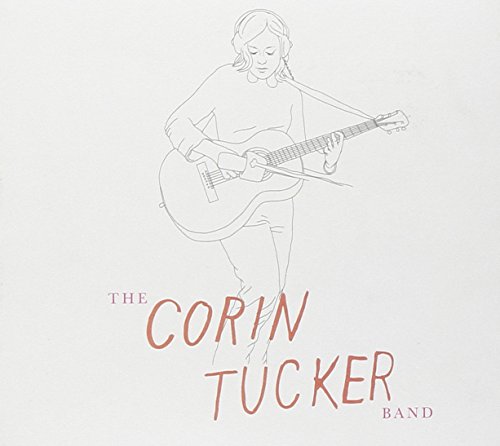
The Corin Tucker Band
1,000 Years
Release Date: Oct 5, 2010
Genre(s): Pop/Rock, Alternative/Indie Rock, Alternative Pop/Rock, Indie Rock, Alternative Singer/Songwriter
Record label: Kill Rock Stars
Music Critic Score
How the Music Critic Score works
Album Review: 1,000 Years by The Corin Tucker Band
Very Good, Based on 8 Critics
Based on rating 8/10
As the primary voice of Sleater-Kinney, Corin Tucker’s reputation was built on savvy Riot Grrrl 2.0 lyrics and near-operatic singing. Her first record outside of that band is defined by the absence of those traits. 1,000 Years is shockingly refined. A reboot after the sonic assault of 2005’s The Woods, there are echoes of Ian MacKaye’s post-Fugazi project The Evens; a necessary levelling off after more than a decade of unsustainable intensity.
Based on rating 4/5
As the former lava-lunged lynchpin of the phenomenal [a]Sleater-Kinney[/a], hearing [b]Corin Tucker[/b] describe her solo debut as “a middle-aged mom record” full of songs originally destined for the Twilight OST didn’t half put the frighteners up us. Luckily, ‘[b]1000 Years[/b]’ is neither boring nor bloodless. Comparisons to SK will doubtless arise but the production here is sparser, with more focus on intricate oddities like the Americana swoop of ‘[b]It’s Always Summer[/b]’, the [a]Wild Beasts[/a]-y clatter that starts imposing on ‘[b]Half A World Away[/b]’ and even a borderline-mawkish piano ballad.
Based on rating 8/10
It's an odd feeling to have lived long enough to feel history's recursion. Theoretically, we know that trends pick up after twenty years or so, that the bell-bottoms in middle school were an absurd 70's throwback for trying-too-hard tweens. But it's different to have lived through the first college-rock sea change and now be slapped in the face with the inevitable nostalgia.
Based on rating 7/10
Since Sleater-Kinney went on hiatus back in 2006, Corin Tucker has spent her time as a stay-at-home mother in Oregon, where she lives with her kids and her husband, director Lance Bangs. It seems presumptuous and dismissive to call her life “quiet”, particularly now that she has returned with a new solo record, since 1,000 Years is anything but quiet. There’s certainly a contentment running over the whole record, but that doesn’t sand down the edges on the want and feeling Tucker conveys in these new songs into some self-satisfied collection.
Based on rating 6.5/10
Sleater-Kinney went on indefinite hiatus in 2006. Since then, drummer Janet Weiss released albums with Quasi and Stephen Malkmus' Jicks, while guitarist Carrie Brownstein embarked on a comedy career with Fred Armisen and became a music blogger for NPR. (The two women also recently announced a new project together, Wild Flag, alongside Mary Timony.) But Corin Tucker has been strangely quiet-- which is ironic given that she was the shrieking-banshee warbler of the group.
Based on rating 3.0/5
As one-third of Sleater-Kinney, Corin Tucker has spent the better part of two decades as one of the most powerful and important voices in rock music, delivering her blistering personal and political sermons with a one-of-a-kind vocal style. With the band on what has been described as an “indefinite hiatus” since late 2006, Tucker makes an overdue return with the Corin Tucker Band’s 1,000 Years. A fine enough record on its own merits, it can’t maneuver its way out of the long shadow cast by Sleater-Kinney, and the album ultimately suffers from many of the same problems encountered by artists who attempt to go solo long after they’ve established an identity as part of a band.
Based on rating C+
Four years after Sleater-Kinney went on indefinite hiatus, their frontwoman returns with a solo record, 1,000 Years, that is not, sadly, much of a substitute. Corin Tucker’s voice — always so uniquely emotive in the punkier contexts of S-K — looms uncomfortably over songs that sound scrapbooked from other ’90s-centric acts (Liz Phair, Pavement) but never take on a form of their own. It’s not so much retro as dated?and for S-K withdrawal sufferers only.
Opinion: Very Good
Since Sleater-Kinney took an indefinite hiatus following 2005’s Dave Fridmann-produced The Woods, Corin Tucker has seemingly been the most reluctant of the trio to explore extracurricular artistic ventures (compared to Janet Weiss dividing herself between Quasi and Stephen Malkmus’s The Jicks and Carrie Brownstein furthering her music journalism endeavours), preferring instead to concentrate on parenting duties and web designing. But given that Tucker’s unique voice ultimately defined Sleater-Kinney’s DNA, it was inevitable that she’d eventually be coaxed back into a studio. The break has evidently given Tucker’s muse a much-needed re-charge and recalibration that puts a comfortable – but not over-stretching – distance between where she is now and where she’s been before.

